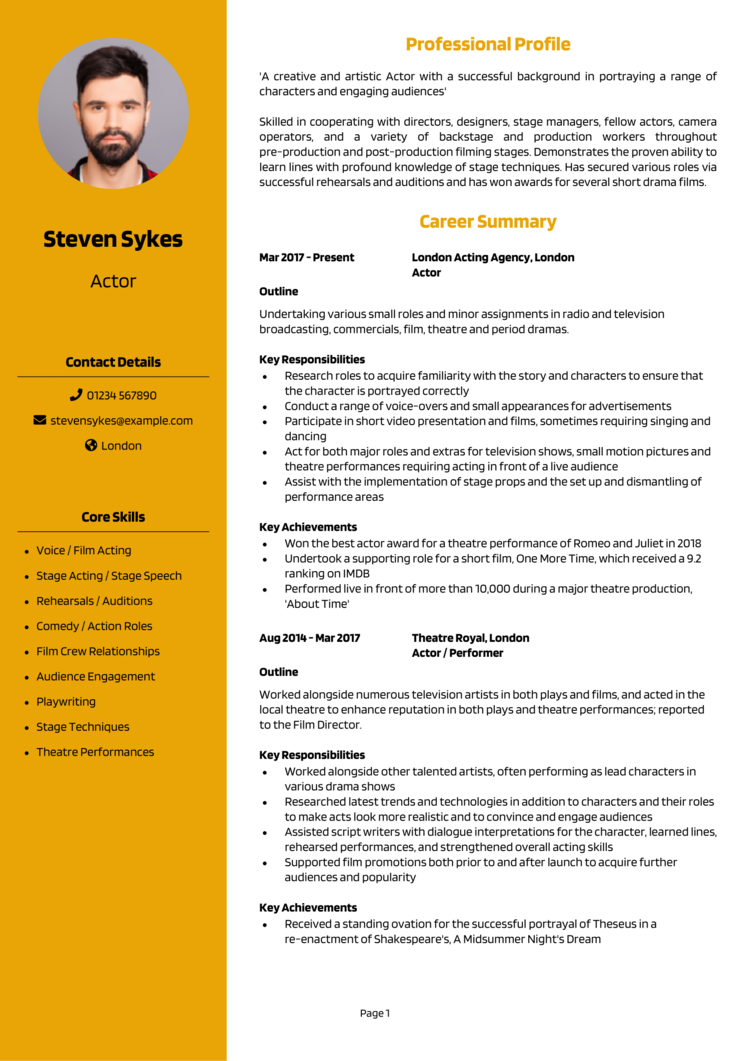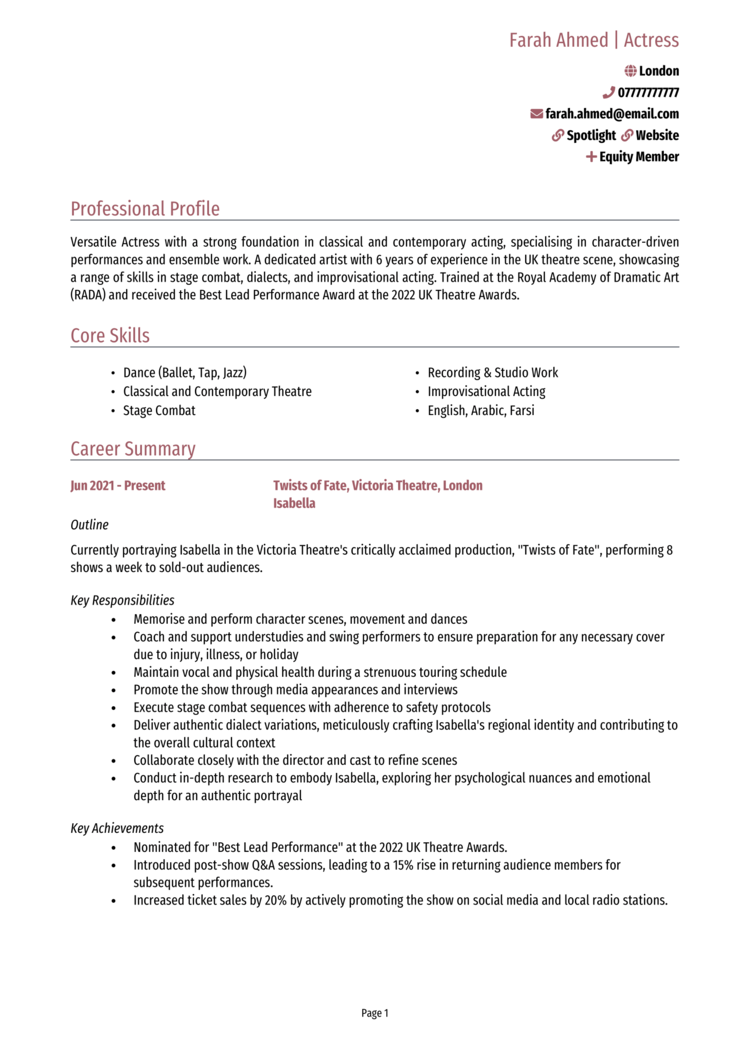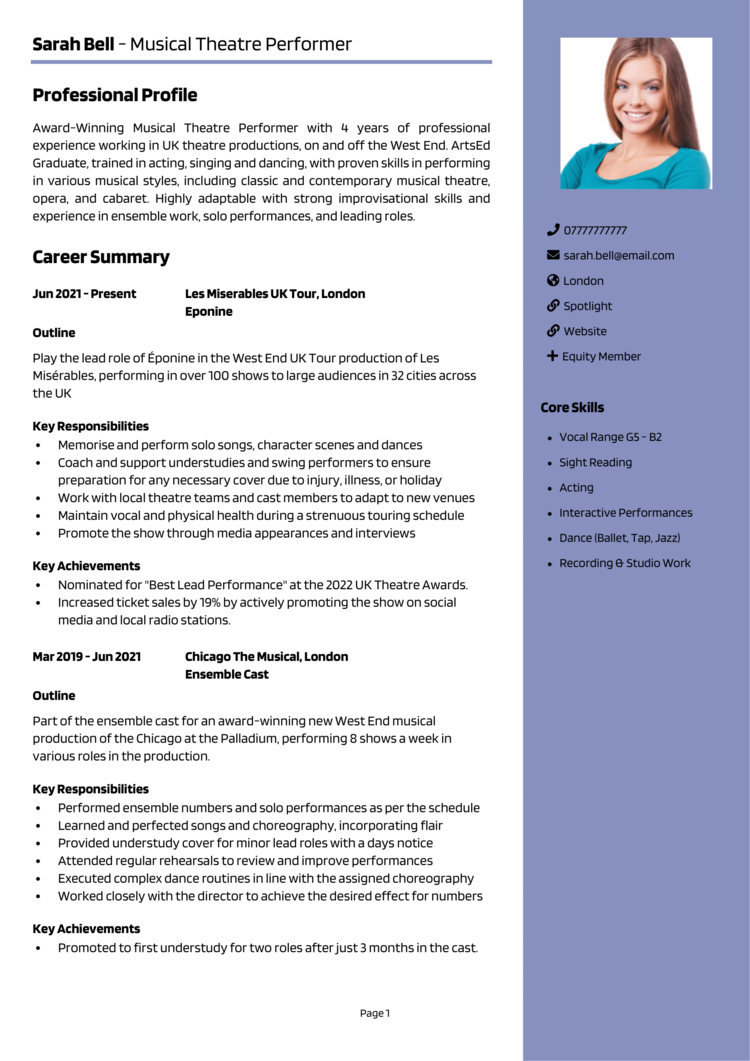Do you have what it takes to step into the spotlight and steal the show? As an actor, your talent and dedication are undeniable, but before you can wow an audience, you’ll need to impress a casting director first.
Think of your CV as your first audition – it needs to showcase your range, experience, and passion for performance. This guide, complete with Actor CV examples, will help you write a CV that earns you a standing ovation (or at least a callback).
Actor CV example

Actress CV example

Voice Actor CV example

Musical Theatre CV example

How to write your Acting CV
Learn how to create your own interview-winning Acting CV with this simple step-by-step guide.
An actor’s CV is a snapshot of your career, training, and special skills. Casting directors want to know you’ve got the chops for the role – on paper, before they see you on stage or screen.
Ready to take your career to center stage? Whether you’re a star of Shakespeare or the king of TikTok drama skits, this guide will help you land your next big role with a good CV.
Acting CV structure


Your CV structure should be as polished and captivating as your best monologue. A clear and logical structure ensures casting directors can easily spot your most important credits and skills.
Here’s how to structure your Actor CV:
- Name and personal details – Keep those contact details at the top so casting agents can easily reach you. Adding a professional headshot or picture of yourself is highly recommended for an acting role.
- Profile – Hook the recruiter with a summary of your acting experience, training, and unique talents in a compelling way.
- Core skills – List off your most important performance abilities, from accents to stage combat.
- Work experience – Showcase your acting credits in reverse chronological order, including roles, productions, and directors.
- Education – Share your formal training, such as drama school or acting workshops.
- Additional info – Add an optional section which includes your hobbies and interests that showcase your versatility or personality, along with any relevant awards.
Best format for an Acting CV


A poorly formatted CV is like forgetting your lines – it doesn’t matter how talented you are, no one’s sticking around to see how it ends. Keep it clean, simple, and professional. A quality CV format ensures casting directors focus on your skills and experience, not your layout.
Here’s how to format your Actor CV effectively:
- Bullet points – Employ short, punchy bullet points to make responsibilities and achievements easy to read.
- Divide sections – Logically organise the information and make it easy to navigate.
- Use a clean font – Choose a professional font that’s easy to read, even in a hurry.
- Keep it the right length – Stick to 2 pages; it’s all about quality over quantity in the acting world, and this is the right length to convey everything you need.
The best way to write an Acting CV profile


Now’s your first chance to tell the casting director why you’re their next lead. Think of it as your opening monologue – short, impactful, and leaving them wanting more. It’ll need to communicate the value and benefit you’d provide them if they gave you the part.
Acting CV profile examples
Profile 1
Versatile Actress with five years of experience performing in theatre productions and independent films. Skilled in bringing diverse characters to life through strong emotional expression and physicality. Recognised for delivering compelling performances in both lead and supporting roles.
Profile 2
Dedicated Film and TV Actor with three years of experience in commercials and drama series. Proficient in taking direction, improvisation, and developing on-screen chemistry. Known for professionalism on set and a commitment to delivering authentic portrayals.
Profile 3
Experienced Stage Actor with over eight years of expertise in Shakespearean and contemporary theatre. Skilled in vocal projection, movement, and character development. Performed in touring productions across the UK, receiving praise for dynamic and engaging performances.
What to include in your Acting CV profile
Here are some tips on what to put in your Actor CV profile:
- Where you’ve worked – Name the theatre companies, film studios, or independent projects you’ve been part of.
- Your top qualifications – Make a note of your formal training, such as a degree in drama or a workshop with a renowned coach.
- Performance expertise – Convey which genres or styles you excel in, from Shakespearean theatre to improv comedy.
- Notable credits – Quickly mention standout roles or productions you’ve been part of.
- Unique skills – Share special abilities like singing, accents, or stage combat training.
Core skills section


Your core CV skills section is like the character breakdown for a casting call – it gives directors a quick snapshot of your abilities. This section should balance technical skills and artistic range, tailored to the roles you’re seeking.
Top skills for your Acting CV
- Script Analysis – Interpreting scripts to understand character motivations, themes, and nuances for authentic performances.
- Voice Modulation – Controlling pitch, tone, and volume to deliver dialogue effectively and convey emotions.
- Stage Blocking – Mastering spatial awareness and movement on stage to align with directors’ instructions and scene requirements.
- Improvisation – Thinking on your feet to create spontaneous dialogue or actions that enhance a scene.
- Accents and Dialects – Adopting various accents and dialects accurately to portray characters from different regions or backgrounds.
- Physical Acting – Using body language, gestures, and facial expressions to communicate emotions and character traits.
- Green Screen Acting – Performing convincingly in front of green screens to integrate seamlessly with CGI and special effects.
- Cold Reading – Delivering lines fluently during auditions or script readings with minimal preparation.
- Stunt Work – Executing basic stage combat, falls, or choreographed moves safely and believably.
- Audition Techniques – Perfecting the art of presenting oneself confidently and memorably during casting calls.
Work experience


Your work experience section is where you showcase your credits and roles. Whether it’s a leading role in a feature film or a part in a local theatre production, focus on the impact of your performances.
Even if your CV isn’t filled with blockbuster hits, every credit counts. That short film with three views on YouTube? It’s still experience, and everyone started somewhere.
What’s the correct way to structure job history on your CV?

- Outline – Provide the name of the production, your role, and the company or director behind it.
- Responsibilities – Highlight key aspects of your performance, such as character preparation or live audience engagement.
- Achievements – Include notable outcomes, like positive reviews or audience accolades. Use numbers wherever possible.
Example jobs for Acting
Stage Actress | BrightLights Studio
Outline
Performed in various stage productions for a regional theatre company, specialising in both classical and modern plays. Delivered memorable performances that captivated diverse audiences.
Responsibilities
- Portrayed lead and supporting roles in 10+ productions, including Shakespearean and contemporary works.
- Collaborated with directors and cast members to develop authentic character portrayals.
- Rehearsed extensively to memorise lines, blocking, and choreography.
- Engaged with audiences during post-show Q&A sessions and promotional events.
- Maintained costumes and props, ensuring seamless transitions during performances.
Achievements
- Received critical acclaim for a lead role in a touring production of Hamlet.
- Improved audience attendance by 20 percent through participation in pre-show promotions.
- Recognised by the company director for consistent professionalism and adaptability.
Actor | StudioVision Productions
Outline
Acted in independent films and TV dramas for a production company focused on storytelling and character-driven narratives. Worked on tight schedules to deliver high-quality performances on time.
Responsibilities
- Performed in 5+ short films and two TV series, portraying complex characters with emotional depth.
- Collaborated with directors to refine character arcs and on-screen presence.
- Adhered to tight shooting schedules, demonstrating flexibility and professionalism.
- Participated in marketing activities, including interviews and social media campaigns.
- Attended workshops to improve acting techniques, including improvisation and method acting.
Achievements
- Won Best Actor at a regional film festival for a role in an independent drama.
- Increased viewership of a TV drama by 15 percent through engaging on-screen chemistry.
- Praised by producers for bringing authenticity and energy to challenging roles.
Commercial Actor | AdPro Agency
Outline
Featured in national advertising campaigns for brands in retail, technology, and lifestyle sectors. Focused on delivering relatable and impactful performances to connect with target audiences.
Responsibilities
- Acted in 10+ TV and online commercials, portraying a variety of characters.
- Memorised scripts and adjusted performances based on client feedback.
- Worked closely with directors and production teams to meet creative briefs.
- Maintained professional conduct during long shoot days in diverse settings.
- Promoted brand campaigns through social media and event appearances.
Achievements
- Increased brand awareness for a retail client by 25 percent through a successful campaign.
- Recognised for delivering a standout performance in a national tech advertisement.
- Secured repeat bookings with multiple clients due to reliability and quality of work.
What should your CV’s education section include?


The education section is critical for actors, as it highlights your training and professional development.
Include degrees in drama, theatre, or related fields, along with workshops, masterclasses, and specialised training (e.g., Meisner technique or vocal coaching).
Always list qualifications in reverse chronological order, starting with the most recent.
Top qualifications to showcase on an Acting CV
- Bachelor of Fine Arts (BFA) in Acting – Covers acting techniques, stage performance, and character development.
- Diploma in Theatre Arts – Focuses on performance, script analysis, and theatrical production.
- Voice Acting Certification – Specialised training in delivering voice performances for various media.
- Stage Combat Certification – Validates proficiency in choreographed fight scenes for stage and screen.
- Improvisation Masterclass Certification – Highlights advanced skills in unscripted performance.





